 “As if lending assistance to him [Hanuman], the moon, with its many thousands of rays, arose in the sky in the midst of a host of stars and covered the earth with a canopy of its light.” (Valmiki Ramayana, Sundara Kand, 2.57)
“As if lending assistance to him [Hanuman], the moon, with its many thousands of rays, arose in the sky in the midst of a host of stars and covered the earth with a canopy of its light.” (Valmiki Ramayana, Sundara Kand, 2.57)candro’pi sācivyamivāsya kurvaṃ |
stārāgaṇairmadhyagato virājan |
jyotsnāvitānena vitatya loka |
muttiṣṭhate naikasahasraraśmiḥ ||
In this passage from the Ramayana, it is said that the moon, in all its glory, shone light on the wonderful, faithful, beautiful and splendorous Shri Hanuman as he made his way into the darkest of regions, the land of Lanka which had been turned into a hellish place due to the sinful deeds of the inhabiting Rakshasas and their leader, the mighty king Ravana. The moon’s bright light aided Hanuman by alighting his path and all the surrounding areas, but it also allowed the sincere onlookers to have a clear picture of Hanuman’s glorious activities, his splendid devotion in the service of Shri Rama, the Personality of Godhead. Hanuman is always resplendent wherever he goes; hence the world always benefits anytime it can get a glimpse of his greatness, his sweetness of thought and deed that permeates every one of his actions. The moon, under the pretense of providing light in the dark of night, found a wonderful viewing position in the sky to observe some of Hanuman’s most amazing feats.
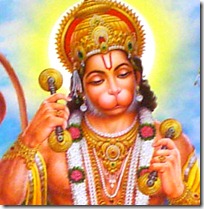 Why the need to watch Hanuman? What was he doing travelling in the dead of night into the city of Lanka in the first place? Was he not welcomed there with open arms? Was not an Ellis Island there to greet him and grant him access to roam freely? The land of Lanka was once a very beautiful place, as it served as the home of Kuvera, the treasurer of the demigods. In Sanskrit, the word “deva” is translated to mean a god, but often times Vaishnavas, devotees of Lord Vishnu, translate the word to mean demigod. While some may take exception to this, the translation is quite accurate. The celestials in the sky – those who reside in the land of the immortals, whose capital city is Amaravati - are certainly very powerful, but they are destined for death at some point, though the end of their life may come after thousands of years. Yet there is one deva who is supreme; hence He is referred to by terms such as “deva varah” and “Bhagavan”. The chief person can be addressed by adding a prefix to the term “god”, or instead the subordinate devas can be described as demigods. The latter practice deprecates the position of the devas versus explicitly elevating the position of the Supreme Godhead.
Why the need to watch Hanuman? What was he doing travelling in the dead of night into the city of Lanka in the first place? Was he not welcomed there with open arms? Was not an Ellis Island there to greet him and grant him access to roam freely? The land of Lanka was once a very beautiful place, as it served as the home of Kuvera, the treasurer of the demigods. In Sanskrit, the word “deva” is translated to mean a god, but often times Vaishnavas, devotees of Lord Vishnu, translate the word to mean demigod. While some may take exception to this, the translation is quite accurate. The celestials in the sky – those who reside in the land of the immortals, whose capital city is Amaravati - are certainly very powerful, but they are destined for death at some point, though the end of their life may come after thousands of years. Yet there is one deva who is supreme; hence He is referred to by terms such as “deva varah” and “Bhagavan”. The chief person can be addressed by adding a prefix to the term “god”, or instead the subordinate devas can be described as demigods. The latter practice deprecates the position of the devas versus explicitly elevating the position of the Supreme Godhead.“From the highest planet in the material world down to the lowest, all are places of misery wherein repeated birth and death take place. But one who attains to My abode, O son of Kunti, never takes birth again.” (Lord Krishna, Bhagavad-gita, 8.16)From the Bhagavad-gita, the song of God sung by Lord Krishna, who is the Supreme Personality of Godhead and the source of all human beings, or Narayana, we learn that repeated birth and death take place even in the home of the demigods. Since His land is never subject to creation or destruction, the original form of Godhead is always supreme. God is the only entity who lives forever within the same spiritual body. The tiny fragmental sparks emanating from the original spiritual fire certainly inherit the property of immortality, but due to their subordinate nature, they can sometimes take on various outer coverings composed of material elements that are temporary in nature. As such, in a conditioned state, the spiritual sparks can develop false identifications and suffer the pain that results. For the Supreme Lord, there are no such defects.
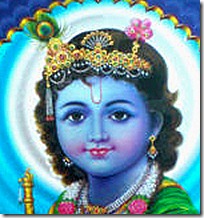 Kuvera was given residence in the island kingdom of Lanka, and he was living there very peacefully. Meanwhile, a clan of Rakshasas headed by a demon named Sumalin sought to have Lanka all for themselves. After they attacked Kuvera and created many disturbances, the Supreme Lord Vishnu Himself descended from the spiritual sky to deal with the situation. Riding on the back of Garuda, the celestial bird carrier of Vishnu, the Lord routed all the Rakshasas out of Lanka and thus allowed Kuvera to live peacefully. Since man will always act according to his nature irrespective of repression or temporary setbacks, Sumalin was in no mood to give up. He decided to take a different course of action. Knowing Kuvera to be the son of the exalted sage Vishrava, Sumalin sent his daughter to approach the sage and ask to have a child with him. When she approached Vishrava, he was deep in meditation, and being able to decipher what she wanted, he cursed her for having bothered him during an auspicious time. She was granted her wish of a child, but due to the curse, the child would be born a Rakshasa prone to sinful activity. Having remorse for her transgression, the lady then asked the sage to grant a benediction that would counteract the curse. Mollified to an extent, Vishrava granted her the boon of having another Rakshasa son who was prone to righteousness from his very birth.
Kuvera was given residence in the island kingdom of Lanka, and he was living there very peacefully. Meanwhile, a clan of Rakshasas headed by a demon named Sumalin sought to have Lanka all for themselves. After they attacked Kuvera and created many disturbances, the Supreme Lord Vishnu Himself descended from the spiritual sky to deal with the situation. Riding on the back of Garuda, the celestial bird carrier of Vishnu, the Lord routed all the Rakshasas out of Lanka and thus allowed Kuvera to live peacefully. Since man will always act according to his nature irrespective of repression or temporary setbacks, Sumalin was in no mood to give up. He decided to take a different course of action. Knowing Kuvera to be the son of the exalted sage Vishrava, Sumalin sent his daughter to approach the sage and ask to have a child with him. When she approached Vishrava, he was deep in meditation, and being able to decipher what she wanted, he cursed her for having bothered him during an auspicious time. She was granted her wish of a child, but due to the curse, the child would be born a Rakshasa prone to sinful activity. Having remorse for her transgression, the lady then asked the sage to grant a benediction that would counteract the curse. Mollified to an extent, Vishrava granted her the boon of having another Rakshasa son who was prone to righteousness from his very birth.In this way, Sumalin’s daughter gave birth to three Rakshasa sons through Vishrava. Ravana was born mostly in the mode of passion, Kumbhakarna in the mode of ignorance, and Vibhishana in goodness. They were all quite capable and powerful in their youth, but seeing that Kuvera was enjoying nicely in Lanka, the mother asked the sons to pray to Lord Brahma, the first created living entity and oldest person in existence aside from God. Only through this method could her sons equal Kuvera in opulence. After undergoing severe austerities and penances to please Brahma, Ravana was granted the boon of being able to defeat anyone in battle, save a human being. Kumbhakarna, being tricked by the goddess of speech, mistakenly asked to be allowed to sleep for very long periods, while only remaining awake for short intervals to eat as much as he could. Vibhishana asked to always remain dedicated to dharma, or the set of law codes instituted by the Supreme Lord.
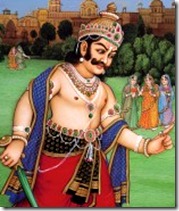 With his newfound powers, Ravana went about touring the three worlds and defeating the greatest fighters. Kuvera abruptly abandoned Lanka after being informed of Ravana’s new unmatched fighting ability. Taking hold of the city along with Kuvera’s celestial airplane, the Pushpaka, Ravana gradually transitioned the beautiful land into one full of ignorance. Though the opulence of Lanka remained, with wonderful palaces full of gold and jewels filling every inch of space, the majority of the land was enveloped by the cloud of ignorance brought on by material contact. For ignorance to reign supreme, the light of knowledge must be kept out. It is seen in bars and nightclubs that the lights are dimmed greatly and that the music blasts at very high volumes. The main business in these establishments is intoxication and the hope for illicit sex through blind meetings between men and women. Since these activities don’t require any intelligence, the atmosphere must match the nature of the engagement. If the lights were left on and peace and quiet were steady, the torchlight of knowledge that can only shine through sobriety, clear vision and meaningful conversation would make the ignorant activities difficult to remain faithful to.
With his newfound powers, Ravana went about touring the three worlds and defeating the greatest fighters. Kuvera abruptly abandoned Lanka after being informed of Ravana’s new unmatched fighting ability. Taking hold of the city along with Kuvera’s celestial airplane, the Pushpaka, Ravana gradually transitioned the beautiful land into one full of ignorance. Though the opulence of Lanka remained, with wonderful palaces full of gold and jewels filling every inch of space, the majority of the land was enveloped by the cloud of ignorance brought on by material contact. For ignorance to reign supreme, the light of knowledge must be kept out. It is seen in bars and nightclubs that the lights are dimmed greatly and that the music blasts at very high volumes. The main business in these establishments is intoxication and the hope for illicit sex through blind meetings between men and women. Since these activities don’t require any intelligence, the atmosphere must match the nature of the engagement. If the lights were left on and peace and quiet were steady, the torchlight of knowledge that can only shine through sobriety, clear vision and meaningful conversation would make the ignorant activities difficult to remain faithful to.Lanka was similarly enveloped in mental darkness twenty four hours a day, with the blindness being especially strong at night. The residents, headed by Ravana, were accustomed to eating meat, drinking wine and engaging in unregulated sex life. Light is not conducive to these activities, so at the time that Hanuman chose to sneak into the city, the nighttime, there was darkness all around, both literally and figuratively. The moon, knowing Hanuman’s mission to be most sublime, decided to beam its beautiful rays all across the land, allowing Hanuman to see clearly while he entered the darkest of realms.
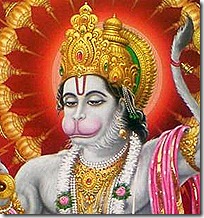 If Hanuman were a Rakshasa or one prone to ignorant activity, he may have been welcomed with open arms. But he was on a mission of peace, rescue and knowledge. The princess of Videha, the beautiful Sita Devi, had been taken away from the side of her husband while residing peacefully in the forest of Dandaka. Ravana had taken her, for although he had hundreds of the most beautiful princesses as wives, he had to have the one woman he considered was the most beautiful. In reality, no one can be with Sita Devi except Lord Rama, her husband. No amount of force, violence, or sweet words can ever deviate Sita’s mind from the lotus feet of her dear husband. Indeed, when she was first married to Rama, she was terribly afraid of touching His feet, which is customary for newly married wives in the Vedic tradition to do. Lord Rama, the Personality of Godhead appearing on earth in a human form to make good on the one loophole to Ravana’s powers of immunity, had liberated the female sage Ahalya simply by stepping on her while she was in the form of a stone. Immediately upon feeling the transcendental impression of the Lord’s lotus feet, Ahalya reassumed her natural form and was transported to the spiritual sky to be in the company of her husband, Gautama Rishi.
If Hanuman were a Rakshasa or one prone to ignorant activity, he may have been welcomed with open arms. But he was on a mission of peace, rescue and knowledge. The princess of Videha, the beautiful Sita Devi, had been taken away from the side of her husband while residing peacefully in the forest of Dandaka. Ravana had taken her, for although he had hundreds of the most beautiful princesses as wives, he had to have the one woman he considered was the most beautiful. In reality, no one can be with Sita Devi except Lord Rama, her husband. No amount of force, violence, or sweet words can ever deviate Sita’s mind from the lotus feet of her dear husband. Indeed, when she was first married to Rama, she was terribly afraid of touching His feet, which is customary for newly married wives in the Vedic tradition to do. Lord Rama, the Personality of Godhead appearing on earth in a human form to make good on the one loophole to Ravana’s powers of immunity, had liberated the female sage Ahalya simply by stepping on her while she was in the form of a stone. Immediately upon feeling the transcendental impression of the Lord’s lotus feet, Ahalya reassumed her natural form and was transported to the spiritual sky to be in the company of her husband, Gautama Rishi.The pure devotees, those who love God without any motive, have no desire for this type of liberation. Heavenly enjoyment and the bliss resulting from merging into the wonderful light of Brahman are not appealing in the least bit to exalted personalities like Sita. Fearing that she would receive the same benediction as was given to Ahalya, Sita at first was hesitant to touch her husband’s feet. She never wanted to be out of Rama’s company for even a second. Yet while in Lanka, not only was Sita separated from Rama, but the prospect of reuniting with Him seemed dim. Ravana’s palace and city were well protected, for the sinful know deep down that they are inviting punishment through their behavior. Even through all their intoxication, the sinful have an idea of the temporary nature of life and the so-called happiness it brings. Therefore those who are unaware that all property originally belongs to God take the most drastic measures in protecting their possessions and way of life.
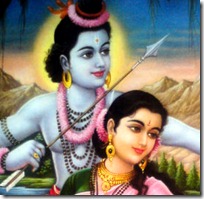 Hanuman was tasked by Sugriva, the king of the monkeys residing in Kishkindha, to go find Sita and return with information of her whereabouts. Rama could have destroyed the whole world as revenge for Sita’s kidnap, but Hanuman and the other Vanaras were quite eager to serve Him. Neither in the heavenly realm nor on earth is there anyone more eager than Hanuman to serve God. As such, he was given the most important task of infiltrating Lanka and finding Sita. Making his way to the outskirts of the city, Hanuman decided to assume a small stature, one having the dimensions of a cat. When he entered the city, the moon decided to shine brightly, allowing Hanuman to always see where he was going. By entering at night, there would be less chance of being recognized by the guards of the city who were always on edge.
Hanuman was tasked by Sugriva, the king of the monkeys residing in Kishkindha, to go find Sita and return with information of her whereabouts. Rama could have destroyed the whole world as revenge for Sita’s kidnap, but Hanuman and the other Vanaras were quite eager to serve Him. Neither in the heavenly realm nor on earth is there anyone more eager than Hanuman to serve God. As such, he was given the most important task of infiltrating Lanka and finding Sita. Making his way to the outskirts of the city, Hanuman decided to assume a small stature, one having the dimensions of a cat. When he entered the city, the moon decided to shine brightly, allowing Hanuman to always see where he was going. By entering at night, there would be less chance of being recognized by the guards of the city who were always on edge.Hanuman is always beaming with the light of devotion, as the seemingly material elements that surround him have no bearing on his psyche or deep love for Sita, Rama, and Lakshmana, the Lord’s younger brother. Indeed, the material elements work under Hanuman’s command; they are his sincere servants. Though Hanuman gives the appearance of being a monkey, he is a divine figure through and through. Sincere devotees of Hanuman take umbrage with the fact that he is described as a monkey when the words of the Ramayana are translated into English. The term used to describe the apelike servants of Rama is Vanara, which literally means “of the vana, or forest”. Yet in other areas of the Ramayana, the same Vanaras are referenced through words such as kapi and hari, both of which can mean “monkey”. So the passages that describe Hanuman as being a monkey are certainly accurate, but from his behavior we know that he wasn’t limited to his body type. Just as Lord Vishnu, when approached by the demigods to descend to earth, stated that He would appear in a human form as Rama, the Vanaras were all celestial figures appearing as monkeys. Though Vishnu refers to Rama as an ordinary human, we know that the Supreme Lord can never assume any material dress or be subject to the influences of the perishable land. The same goes for Hanuman, as the monkey form simply facilitates the beautiful activities he takes up.
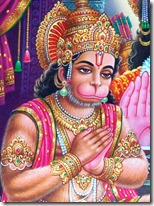 Not surprisingly, Hanuman would succeed in his mission, as he would find Sita, allay her fears, and safely return to Sugriva’s camp. The moon was fortunate enough to witness all of these events by shining its bright light. It derived great pleasure from Hanuman’s activities, and many generations since then have also been pleased to the heart by hearing of the Vanara’s wonderful exploits. Lanka once again became full of transcendental light after Ravana was defeated by Rama and Vibhishana subsequently installed as the ruler. Yet the city never shone brighter than when the moon lit the path for the beautiful Hanuman to enter and perform his magic. Wherever Hanuman goes he brings with him his brilliant effulgence, and wherever there is his light of devotion, there is peace, prosperity and the firm faith that we will one day reunite with our best friend, the Supreme Lord.
Not surprisingly, Hanuman would succeed in his mission, as he would find Sita, allay her fears, and safely return to Sugriva’s camp. The moon was fortunate enough to witness all of these events by shining its bright light. It derived great pleasure from Hanuman’s activities, and many generations since then have also been pleased to the heart by hearing of the Vanara’s wonderful exploits. Lanka once again became full of transcendental light after Ravana was defeated by Rama and Vibhishana subsequently installed as the ruler. Yet the city never shone brighter than when the moon lit the path for the beautiful Hanuman to enter and perform his magic. Wherever Hanuman goes he brings with him his brilliant effulgence, and wherever there is his light of devotion, there is peace, prosperity and the firm faith that we will one day reunite with our best friend, the Supreme Lord.
No comments:
Post a Comment